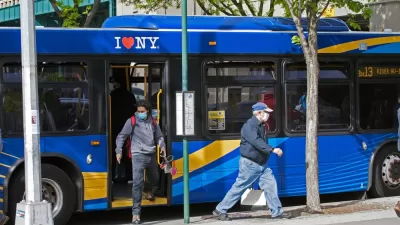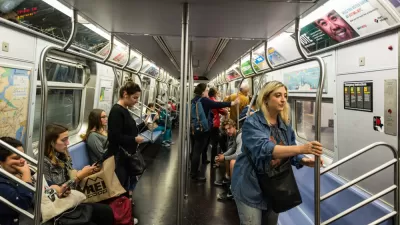A New York transit advocate says the MTA is entering a "death spiral" of reduced service and higher fares that will lead to fewer riders and then additional reduced service and higher fares.

"Officials at the Metropolitan Transportation Authority (MTA) warned last week that without a major infusion of cash, they will have to drastically cut service or increase fares on the system that carries millions of New Yorkers around the city," reports Erin Durkin.
Specifically, the MTA is proposing both a 25-cent increase in the cost of fares—from $2.75 to $3. "They are also proposing $41m a year in service cuts, mainly increasing the time between trains and buses on some routes. And, if approved, the plan would delay the launch of faster bus routes," according to Durkin.
The headline of the article quotes Benjamin Kabak, who runs the transit website Second Avenue Sagas, who says the MTA subway has entered a "death spiral."
"The subway service and the bus service has become unreliable enough for people to stop using it. If people aren’t using it, there’s less money, and they have to keep raising fares without delivering better service," adds Kabak in the article.
FULL STORY: New York City subway and bus services have entered 'death spiral', experts say

Maui's Vacation Rental Debate Turns Ugly
Verbal attacks, misinformation campaigns and fistfights plague a high-stakes debate to convert thousands of vacation rentals into long-term housing.

Planetizen Federal Action Tracker
A weekly monitor of how Trump’s orders and actions are impacting planners and planning in America.

In Urban Planning, AI Prompting Could be the New Design Thinking
Creativity has long been key to great urban design. What if we see AI as our new creative partner?

King County Supportive Housing Program Offers Hope for Unhoused Residents
The county is taking a ‘Housing First’ approach that prioritizes getting people into housing, then offering wraparound supportive services.

Researchers Use AI to Get Clearer Picture of US Housing
Analysts are using artificial intelligence to supercharge their research by allowing them to comb through data faster. Though these AI tools can be error prone, they save time and housing researchers are optimistic about the future.

Making Shared Micromobility More Inclusive
Cities and shared mobility system operators can do more to include people with disabilities in planning and operations, per a new report.
Urban Design for Planners 1: Software Tools
This six-course series explores essential urban design concepts using open source software and equips planners with the tools they need to participate fully in the urban design process.
Planning for Universal Design
Learn the tools for implementing Universal Design in planning regulations.
planning NEXT
Appalachian Highlands Housing Partners
Gallatin County Department of Planning & Community Development
Mpact (founded as Rail~Volution)
City of Camden Redevelopment Agency
City of Astoria
City of Portland
City of Laramie





























